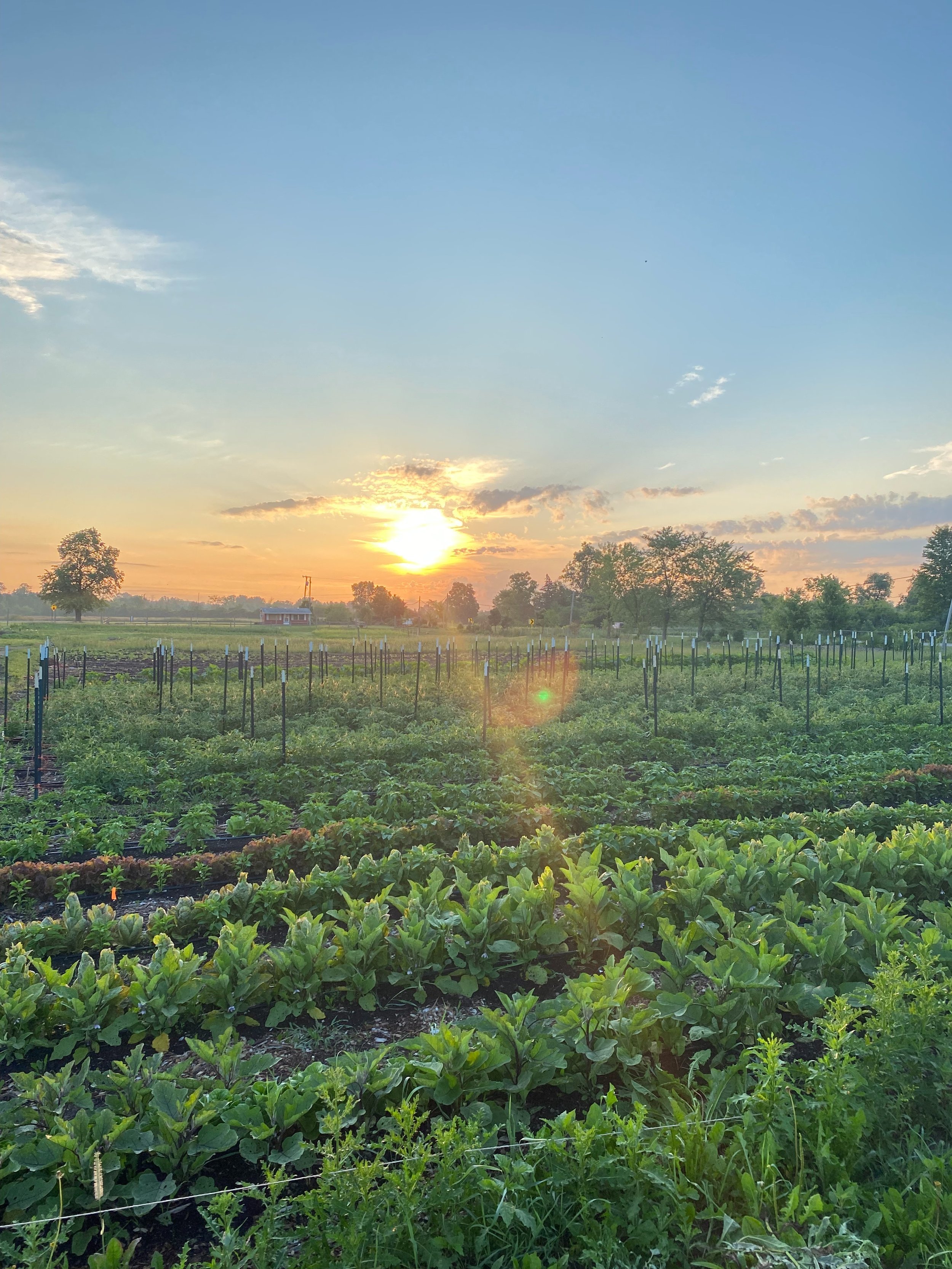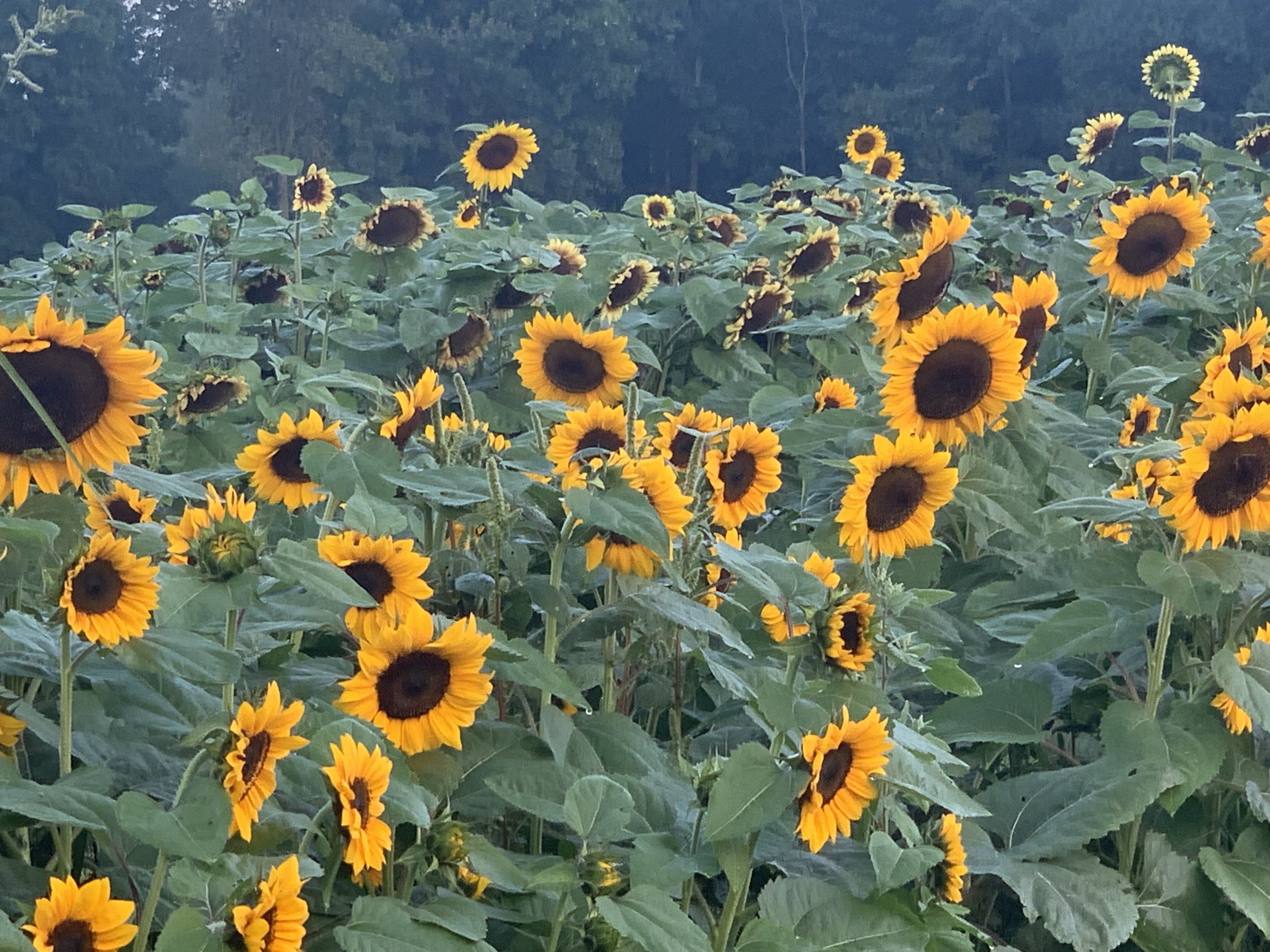
Land Stewardship
To Protect Our Future
Gateway Farm is an ambitious, cutting-edge farm project and business located in Plymouth, Michigan.
It is putting into practice a regenerative, permaculture-inspired design that weaves together USDA certified organic market gardening, food forests, land regeneration and re-wilding, and is a demonstration site for these approaches. Gateway Farm is a place of abundance and beauty; a community hub offering nutrient dense food, education, events, sanctuary, and hope for the future.

Acres dedicated to annual organic vegetable production
4
Acres dedicated to perennial organic crop production & rewilding
4
Acres dedicated to buildings, pathways, and infrastructure
4
Our
Growing
Practices
-
‘Organic certification means that farmers and businesses have met strict standards for the growing, processing and handling of their products. If you see the USDA Organic seal, the product is certified organic. Organic production emphasizes natural processes and ingredients.’
Source - Wikipedia
-
We are deeply passionate about our Food Forest which is a resilient system encompassing wide varieties of species and cultivars, and which is preserving food heritages.
Food Forests (aka Forest Gardens or Perennial Food Systems) are long-term planned food yielding systems that are also complex polycultures. Food Forests are a move away from simplified industrial agriculture (monocultures) and towards the restoration and remembering of highly skilled farming and gardening relationships and practices.
-
Gateway Farm Hub is permaculture-inspired, an example site designed to be a large-scale sustainable system.
Permaculture is the design and practice of making sustainable systems - often applied to farm and homesteading systems and perennial foods. Permaculture inspired design means taking a holistic and ethical approach to design that sees the living organic world as of the highest importance.
-
Regenerative farming looks to build all the elements that make a healthy farm: building soil, seed banks, workers’ well-being, cultural capacity, local economies, catchments, and ecologies. These are the core tenants of Gateway Farm Hub.
Most industrial farming is degenerative – it tends to degenerate soils, our crop heritage, our diets and our health, and the health of our communities and economies and livestock.
Source - Wikipedia
-
We utilize low-tilling so that we can build natural soil processes, improving the health of our soil rather than depleting it.
The soil where the crops are grown is both allowed, and helped, to build naturally. Most farm soils are broken up frequently with rotavators and plows, which when done regularly inhibits natural bacterial and fungal associations and functions.
-
The organic produce at Gateway Farm Hub is as nutrient dense as you can get because we put so much love into the soil and eco-system!
‘Nutrient-dense foods contain vitamins, minerals, complex carbohydrates, lean protein, and healthy fats.’
Source - National Cancer Institute
-
We are dedicated to limiting as much waste as possible. For example, our CSA Crop boxes are reused every week, returned to us by our customers!
‘A circular economy entails markets that give incentives to reusing products, rather than scrapping them and then extracting new resources. In such an economy, all forms of waste, such as clothes, scrap metal and obsolete electronics, are returned to the economy or used more efficiently’.
Source – UNCTAD
-
It’s been amazing to see the land here at Gateway Farm Hub come to life through our rewilding encouragement!
‘Rewilding is a progressive approach to conservation. It's about letting nature take care of itself, enabling natural processes to shape land and sea, repair damaged ecosystems and restore degraded landscapes. Through rewilding, wildlife's natural rhythms create wilder, more biodiverse habitats’.
Source - Rewilding Europe
-
Gateway Farm has invested time and energy into rebuilding ponds, creeks and waterways on the farm.
We recognize the vital importance of repairing riparian zones because of their 'role in soil conservation, their habitat biodiversity, and the influence they have on fauna and aquatic ecosystems, including grassland, woodland, wetland or sub-surface features such as water tables.'
'Riparian-zone restoration is the ecological restoration of riparian-zone habitats of streams, rivers, springs, lakes, floodplains, and other hydrologic ecologies.’
Source - Wikipedia
-
Educational programs at Gateway Farm Hub utilize horticultural therapy techniques.
‘Horticultural therapy is a time-proven practice. Horticultural therapy techniques are employed to assist participants to learn new skills or regain those that are lost. Horticultural therapy helps improve memory, cognitive abilities, task initiation, language skills, and socialization.’

A Place Of Beauty And Sanctuary
Places can be healthy or they can be unhealthy – this is both literally and psychologically. They can also be in the process of healing. A sanctuary offers a place to find respite, a retreat, a place of convalescence in a difficult world. Gateway Farm Hub has been turned into a place of sanctuary, offering respite to those seeking peace from the separation caused by time indoors and on the internet. Read more here.
Promoting
Species Diversity
There are over 325+ plant species and varieties on our farm.
75+
of those are annual species and varieties.
250+
of those are perennial species and varieties.
Designed to
Support Pollinators
28% of our total outdoor growing space is dedicated to pollinator plants.
69%
of our plants are in rows.
20%
of those rows are dedicated to pollinator plants.
31%
of our plants are perennials
We acknowledge the Ojibwe, Potawatomi and Anishinaabe Nations whose lands we are most often living and working on and whose cultures inspire and influence us.
We pay respects to Elders and Teachers past, present and future, and to all First Nations Peoples around the world.
We respectfully ask to be guided by the Spirits of the places in which we walk, work and live.
Where We Started
& Where We Are Now
Before 2014
Our 4 acre property was a driving range.
2017
We began rebuilding and regenerating the land by adding ponds, waterways, berms, swales and soil nutrients.
2020
We continued re-imagining the landscape and added in our food forest, began offering perennial foods and value-added products.
Today
We’re opening our literal and metaphorical gateways to the public: we now offer workshops, event rentals, on-site markets and more.
Gateway Farm was established in 2016 by Mary Emmett and her family, owners of Plymouth Orchards. Their intention was to create a farm hub offering organic nutrient dense food to the Plymouth Community, while at the same time, transition the orchard to organic production.
Since then, the Gateway Farm vision has broadened to become a community hub offering educational workshops, events, sanctuary, and hope for the future. The Gateway team continues to transform what was once an old golf driving range into a beautiful place of biodiversity, healing and abundance.
The farm employs 15-20 people during the busy season; a dedicated management team to keep us focused on our business strategy and vision, alongside 9-10 hard-working annual and perennial crew members building, maintaining, and harvesting from the vegetable fields and perennial food berms.
The farm has diversified a great deal in the last five years, going from offering solely organically grown annual vegetables, to showcasing diversified food systems by offering perennial foods, dried herbal teas, and other value added products. We’ve re-imagined our farm-scape using a permaculture-inspired vision that weaves together market gardening, food forests, land regeneration and re-wilding. Our community based educational workshops, farm tours and seasonal on-site markets have helped to make us a community hub that not only nourishes the land and our body, but the mind and spirit as well.




